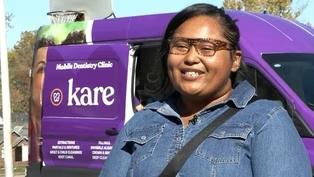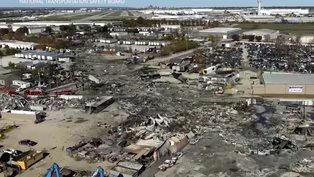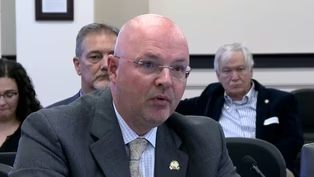
LMPD Chief on First Year as Department Head
Clip: Season 4 Episode 95 | 8m 26sVideo has Closed Captions
The head of LMPD looks back on his first year leading Kentucky's largest police force.
Violent crime numbers are down in Kentucky's largest city, but the Louisville Metro Police chief says he's just getting started. Our Kelsey Starks sat down with LMPD Chief Paul Humphrey, as he looks back on his first year as head of the department and ahead to what's next.
Problems playing video? | Closed Captioning Feedback
Problems playing video? | Closed Captioning Feedback
Kentucky Edition is a local public television program presented by KET

LMPD Chief on First Year as Department Head
Clip: Season 4 Episode 95 | 8m 26sVideo has Closed Captions
Violent crime numbers are down in Kentucky's largest city, but the Louisville Metro Police chief says he's just getting started. Our Kelsey Starks sat down with LMPD Chief Paul Humphrey, as he looks back on his first year as head of the department and ahead to what's next.
Problems playing video? | Closed Captioning Feedback
How to Watch Kentucky Edition
Kentucky Edition is available to stream on pbs.org and the free PBS App, available on iPhone, Apple TV, Android TV, Android smartphones, Amazon Fire TV, Amazon Fire Tablet, Roku, Samsung Smart TV, and Vizio.
Providing Support for PBS.org
Learn Moreabout PBS online sponsorshipViolent crime numbers are down in Kentucky's largest city, but the Louisville Metro Police chief says he's just getting started.
Our Kelsey Stark sat down with Lmpd Chief Paul Humphrey as he looks back on his first year as head of the department and ahead to what's next.
Welcome, Lmpd Chief Paul Humphrey.
Thanks for being here.
It's been a little more than a year now since you've been on the job.
I want to go through a few numbers here.
Homicides down 25%.
Nonfatal shootings down 26%.
Carjackings down 30%.
What's working?
Well, we're going in the right direction.
Obviously we're not where?
Anywhere close to where we want to be.
I would love to be able to double those numbers and save even more families from from suffering from those tragedies.
But I think we have a combination of things.
As one, officers are excited about doing their jobs, and they want to feel like they're supported in doing their jobs, and I hope that they feel that way.
And I think we're making strides in that.
The other is the community support.
Officers feel community support.
You know what that feels like when you when you receive it.
And we're receiving a lot more support and cooperation.
And so the combination of proactive police work, community support and collaboration ultimately lead to those types of, successes.
What do you think's changing with the community?
Why why is there more support now for the department than before?
Well, I think there's an understanding of the need for police work.
Obviously.
You know, in the last, 5 or 6 years, we went through some pretty difficult times as a city and as a country.
And when it comes to, what this profession means to America and what it means to, Louisville.
And so I think there's a realization that we have to have, community and police collaboration in order to keep people safe.
Ultimately, that's what people want, right?
They want to be safe.
They want to have fun.
They want to be able to relax in their own homes and that requires that there is a level of safety, there's a level of policing that goes on and people feel like their police department is policing for them, not policing them.
What do you see as some of the biggest challenges or obstacles that are still ahead for you?
What's your what's your focus on right now?
Well, obviously, like I said, those crime numbers are nowhere near where we want them to be, and they're up farther than than they were historically.
So we still have to continue focusing on on violent crime.
But that comes from continuing to build community relationships, continuing to make sure that officers feel like they are knowledgeable, talented, given the resources to go out there and do their jobs and a successful way, so that we can continue to bring more people through the door.
Obviously, recruitment over the last several years has been an extreme problem.
Not just for the profession, but for Louisville specifically.
And so, part of my focus is to make sure that officers feel really good about the place that they work, so they're more likely to advertise, hey, come work for us.
You mentioned recruitment.
Last time we talked, you said this is a huge problem and now you're having your biggest recruitment class in several years.
What does that feel like for you?
And how has that has that happened?
So that's that's very exciting to have a class of over 40, 40 people for the first time in in several years.
However, what I'll say is that we have to level set for the community expectations.
This is a problem that is not going to be solved in a recruit class or two.
It's a problem that that it took us several years to get into, and it's going to take us several years to get out of.
So we have to make sure that we maintain the momentum of making sure that the community understands the importance of police work.
They value public service and have a desire to come join us, and that the officers here feel like they're valued and proud of the job that they do, so that they bring more people through the door as well.
A lot of that has to do with resources available.
As we're looking ahead now to the upcoming legislative session, what are some of the priorities there that you were hoping?
The state can help your department do to increase resources, increase that, support for the department, right.
When it comes to the legislative side, we're always looking for different ways to assist us in keeping the public safe.
And, you know, a couple of things that we're working on is a ban on Glock switches.
These are easy to make, manufacturer purchase, drop in devices that turn a pistol into a fully automatic weapon.
They're extremely dangerous.
And they're becoming more and more, available on the streets.
And so that's something that we're working with the legislature to, to, to get rid of so that we can make sure that, people are safe.
One of the other pieces that I would like to see is automatic traffic enforcement.
And so that would be like a red light camera type, issue.
And, you know, I'm not a traffic cop.
I never did that type of work.
Used to make fun of traffic cops until I got in a position where I realized, you know what?
Traffic enforcement is a key to public safety.
When, you know, in the United States, I think we have something like 40,000 people die on the roads a year.
That is unacceptable.
And what we saw in the past ten years, it's not just that violent crime deaths went up, but our traffic related deaths went up 25 or 30%.
And so we need as many tools as we can in order to make sure that people are driving safely and keeping them safe out on the street.
And then, as you kind of look back on this year, what are are you most proud of?
And is there anything that you wish you had maybe done differently?
Oh, gosh.
You know, I think it's it's much easier to point out all of the, mistakes that I've made along the way.
Obviously, I've never been a chief before.
I didn't, didn't expect to be in this role at this point.
But, one of the things that I'm proudest of is having the people around me that I work with know that they can say, whatever they need to say to make sure that we're going in the right direction.
This is not a job.
This is not a role that you can do by yourself.
And I feel like we've created an environment where from the newest person on the police department all the way up to our executive staff, they can express their concerns, their ideas, and they have a voice in how this police department runs.
And I think that's very important because no one can do this alone.
And so we've we've tried to create as much as possible, a collaborative police department that everybody has, value in.
And, right now you all are hosting a couple of other cities here this week, and collaborating with other departments.
Tell me about that now.
Very exciting.
So we've created what's called the Tri Cities Police Leadership Academy, in collaboration with both the city of Knoxville and the city of Nashville.
And it all spawned out of, recognition that, there is a gap in leadership training in the profession.
You know, when you're first promoted to sergeant, you everybody has leadership training, and then you kind of get left out until you get to an executive level.
And so there was a gap.
I've been, I've been all across the country and been able to see some amazing instructors in the profession as well as in the private sector.
But that took until I was, you know, at the executive level.
And so what we wanted to create was opportunities for mid-level managers and leaders, both sworn and professional staff.
So it's not just, the police officers.
We have our, our human resources director, our head of our traffic guards is in the class.
We want to make sure that they get that exposure so that they have the skills, the tools and the resources to be, great leaders as they want to be.
And so this is a really innovative thing that we've done.
We're the first, group of cities across the country to have done a collaborative leadership academy like this.
So we're excited that we're creating a new model and we'll continue to build on it.
That's great.
And that's happening right now.
Thanks so much for being here.
Thank you.
So back to you.
Thank you.
Kelsey.
The Tri City Police Academy first met and Knoxville in October.
This week, sessions are being held in Louisville and the summit will wrap up in Nashville in December.
Mobile Market Brings Food, Relief to Struggling Families
Video has Closed Captions
Clip: S4 Ep95 | 3m 44s | Black Soil's mobile market provides free or low-cost groceries and produce. (3m 44s)
NTSB on What Cockpit Voice Recorder Is Revealing about UPS Crash
Video has Closed Captions
Clip: S4 Ep95 | 2m | NTSB reports ‘repeating bell sound’ heard in cockpit before UPS plane crash. (2m)
Push to Expand Job Training for Inmates
Video has Closed Captions
Clip: S4 Ep95 | 3m 8s | Some state lawmakers want to see more job training for inmates. (3m 8s)
Providing Support for PBS.org
Learn Moreabout PBS online sponsorship
- News and Public Affairs

Top journalists deliver compelling original analysis of the hour's headlines.

- News and Public Affairs

FRONTLINE is investigative journalism that questions, explains and changes our world.












Support for PBS provided by:
Kentucky Edition is a local public television program presented by KET


